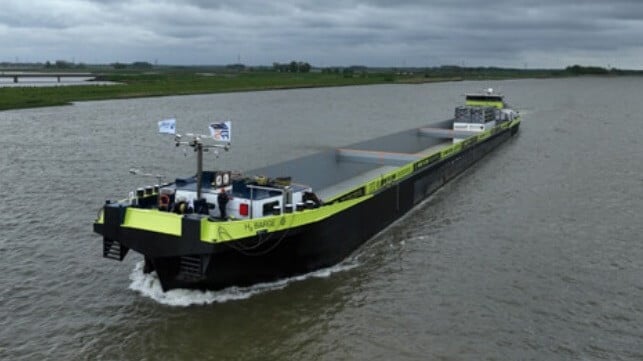Hydrogen-Powered Inland Cargo Barge Ready to Sail on the Rhine

The retrofit has been completed and a new hydrogen-powered cargo barge is now ready to begin operations on the Rhine sailing between Rotterdam in the Netherlands and Duisburg in Germany. Dutch shipowner Future Proof Shipping (FPS), the EU-funded Flagships project, and the Interreg-funded ZEM Ports NS project celebrated that milestone in a project that they believe will serve as a model for the industry.
“This is another proud moment for us, it proves moving cargo with zero emissions and zero impact is not only possible, it’s scalable too,” said Richard Klatten, CEO of Future Proof Shipping. “Successfully launching our second hydrogen-powered inland cargo vessel is just as important an achievement as the first, not just for Future Proof Shipping, ZEM Ports NS, and the Flagships project, but for the future of green shipping.”
FPS announced its plans for the conversion of the two barges in 2021 and working with partners including Holland Shipyard Group´s Werkendam facility, just outside Rotterdam, overcame key hurdles to bring the ships to service. The first barge was completed in May 2023 with the plan calling for the vessel to operate between Rotterdam and Antwerp. It is chartered to BCTN Network of Inland Terminals on behalf of Nike EMEA. The company has said its plan is to put 10 inland and short-sea vessels into service in the five years.
The H2 Barge 2 is the first of two demonstrators in the EU-funded Flagships project, and the second demonstrator of the ZEM Ports NS project. The vessel, formerly Fenny 1 and FPS Waal, was built as a conventionally powered containership. It is 360 feet (110 meters) in length with a capacity of approximately 200 TEU.
During 2023, H2 Barge 2 was stripped of all combustion engines and fossil fuel tanks by Holland Shipyards Group after reaching the yard in August. Now, the vessel has a completely emission-free propulsion system including PEM fuel cells, hydrogen storage, battery packs, and an electric drive train installed below deck. Six fuel cells from Ballard Power Systems raise the total power installed to 1.2 MW. H2 Barge 2 is expected to reduce 3,000 tonnes of CO2 annually when sailing the Rhine.
“Inland waterways are important for freight transport in Europe,” said Mirela Atanasiu, Executive Director ad interim of Clean Hydrogen Partnership. “We are thrilled to see a high-power container vessel being converted to zero-emission. The H2 Barge 2 will bring knowledge on how to retrofit vessels from diesel combustion to zero-emission alternatives, by using batteries in combination with green hydrogen in a fuel cell.”
The second demonstrator vessel in the Flagships project, Zulu 06, will be deployed in Paris in 2024.

that matters most
Get the latest maritime news delivered to your inbox daily.
“We´ve been working hard for several years to get to this point. Having the first demonstrator on the Rhine is truly a great achievement by Future Proof Shipping and the rest of the partners. The aim of the Flagships project is to take zero-emission waterborne transport to an entirely new level. Now we´re one important step closer to reaching our goal,” says Flagships Project Coordinator and Senior Scientist at VTT, Jyrki Mikkola.
The project was made possible with funding support from the Interreg North Sea Region Programme (Zero Emission Ports North Sea – ZEM Ports NS), Flagships H2020 Project (Clean Hydrogen Partnership), and Netherlands Enterprise Agency (RVO).
